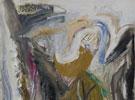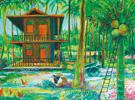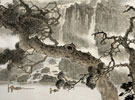张小涛:我去浙江天台山国清寺,门票才5块钱,这里是天台宗的祖庭,隋代的大寺庙,这里有柳公权、欧阳询、于右任、蒋中正,有康有为、等的书法和匾额。历史气息、文化底蕴深厚,它们就抵抗商业化,全面的市场和商业化是全球化带来的一个重要的改变,中国现在可能是全世界最物质化的国家。
Zhang: I went to Guoqing Temple on Tiantai Mountain, Zhejiang Province. The entry ticket was only 5 yuan. This is the ancestral hall of Tiantai Zong, a massive temple from the Sui dynasty. There are inscriptions from Liu Gongquan, Ouyang Xun, Yu Youren, Chiang Kai-shek, Kang Youwei and many other notable Chinese figures. It has a strong historic and cultural atmosphere. They resist against commercialization. Full market-orientation and commercialization is a big change that has been brought on by globalization. China just might be the most materialistic country in the world.
戴卓群:我最近刚从欧洲回来,在罗马、佛罗伦萨、米兰、苏黎世、巴黎都要去最著名的教堂瞻仰,我觉得欧洲的宗教也在面对世俗化的问题,并且走过的路远比我们更长久,但是他们的神圣世界却庄严地保留下来了,回想国内却只剩利欲烟熏的寺庙与利欲烟熏的和尚,阿米托佛,铜臭无边。
Dai: I just came back from Europe. I went to see all of the important churches of Rome, Florence, Milan, Zurich and Paris. I think that European religion is also facing the problem of secularization, and they have gone much further down the path, but their sacred world has been carefully preserved. When I think back about all the money-tainted temples and monks in China, Amitabha! The stench of money is everywhere.
张小涛:今年五月我们去意大利考察有一个感受就是,意大利的宗教和世俗的关系,他们教堂在市中心,今天的宗教生活还蕴含在他们日常生活里面,这是很重要一点,他们的道德底线和人的良知还是来自宗教的约束,我想把《萨迦》做成一个关于宗教生活的某种缩影,是我们解读神圣宗教世界在今天的现实遭遇,也是我们重新观看传统的通道。我去每一地方一定要去寺庙看看,尤其欧洲国家的教堂、博物馆、公墓是一个国家的“魂”。
Zhang: An impression I had on a trip to Italy this May was about the relationship between religion and the secular world in Italy. Their churches are at the city centers, and the religious life is still part of their everyday lives. This is important. Their morality and conscience is still influenced by their religion. I wanted to make Sakya a microcosm of religious life, one that could help us decode the predicament of the sacred religious world in today’s reality, and a path for looking at religion anew. Wherever I go I want to see the temples. The churches, museums and cemeteries in Europe are the “souls” of a nation.
戴卓群:欧洲也在走向现代化,走向工业化,走向商业社会,也有破坏它本身的宗教文明和信仰,但是在亚洲,尤其是在中国,所有这些(宗教和信仰)东西都彻底遗失了。
Dai: Europe is also moving towards modernization, industrialization and commercial society. They are also destroying their religious civilization and faith, but in Asia, especially in China, these things have been completely wiped out.
张小涛:自五四以来,我们一直在解构、颠覆、摧毁传统,文革是消灭了一部分,今天的物质主义可以说是全面的摧毁历史文脉。我们其实什么都没有建立起来,抗战时战火纷飞,西南联大的学术研究成果,今天我们的大学都难以比肩的。重要的不是物质,而是信仰的力量和精神的传承和演变。
Zhang: Ever since the May 4th Movement, we have been constantly deconstructing, overturning and destroying traditions. Part of it was destroyed during the Cultural Revolution. Today’s materialism could be said to be completely destroying our cultural roots. We haven’t actually built anything. As the fires of war burned during the Second World War, the Southwestern United University was producing academic results that our universities today can’t hold a candle to. It’s not the material that matters; it is the power of faith and the carriage and evolution of the spirit.
戴卓群:文革是一种直接的、硬性的破坏,其实质还是一个被政治形态极端化了的焚书坑儒的路子,现在是干脆消费掉,消费掉以后就没有意义了,所有的意义和价值就消解掉了。
Dai: The destruction of the Cultural Revolution was direct and solid. It was in essence an ideologically extreme path of burning books and fighting ancient traditions. Now things are just consumed, and once they’re consumed, they become meaningless. All of the meaning and value is dissipated.
张小涛:我用水墨给儿子画《望庐山瀑布》、画李白、画银河落九天、画《登高望远》的亭台楼阁和山水,拿南宋四家的画册给他看,他很奇怪,我们为什么写一首诗?再画一张画?要回答这个看似简单的问题,其实是一个完整的美学问题,很难解释。我们只能在书里和记忆里寻找传统,小孩子的传统教育挺重要的,就是让他有根,在他内心里有可以很坚定的东西。
Zhang: I used ink to paint famous Chinese paintings with poetic inscriptions for my son. He was confused. Why would I write a poem? Why would I paint another painting? This seemingly simple question is actually a very complete question of aesthetics, and is quite difficult to explain. We can only seek out traditions within books and memories. Traditional education for children is very important. We need to give them roots, something that will persist.
戴卓群:这也是一种形式,你在教育小孩的时候,没有给他看毕加索的画册而是在传输中国古典文明的东西,虽然是浅显的、点点滴滴的。
Dai: This is also a form. When you educate your child, and you show him things from classical Chinese civilization instead of the paintings of Picasso, though it is only the surface, it can add up.
张小涛:毕加索的画他以后会喜欢的,他老问我为什么古人旁边老是有松树啊?为什么每一个人都有古琴啊?每一个都有书童啊?为什么山上有亭子啊?他充满了好奇,我常常和他用毛笔去涂鸦、一起诵读《三字经》、《弟子规》、《论语》等 ,传统教育在今天是一种奢侈。
Zhang: He will enjoy Picasso’s paintings later. He always asks me why the ancients always have pine trees next to them, or why they’re always carrying zithers, why there are children carrying books for them, or why there are pavilions at the tops of the mountains. He is full of curiosity. I often use a brush to make scribbles for him, and we’ll recite classic recitation texts together, like the Three Character Classic, Rules for Students or the Analects.
戴卓群:像萨迦小学的课程里有宗教的内容吗?
Dai: Is there any religious content in the curriculum at the Sakya Primary School?
张小涛:没有,他们有藏语课,其他课程和内地小学差不多,我们采访了一个唐卡画师,他有五六个弟子,他们坚持用传统的工艺来画唐卡。当地很多人都去外面做生意,打工,只要是读了书的孩子就不再去寺庙当喇嘛,这是很现实的变化。
Zhang: No. They have Tibetan language courses, and the rest of the curriculum is about the same as schools anywhere else. We interviewed a Thangka painter. He has five or six apprentices, and they persist in using traditional techniques to paint Thangkas. A lot of the locals go out to do business and find work. None of the kids who get schooling go to the temple anymore to become lamas. This is a very cynical change.
戴卓群:新式教育越普及,这种能力消失得就越快。
Dai: The more that new education spreads, the more this power will be diminished.
张小涛:是,这是一个矛盾的产物,人类应该保持信仰,也应该有世俗化的进程,也应该有享受现代文明的权利,这个度不好把握。
Zhang: Yes. This is a product of contradiction. Mankind should maintain faith, but should also have a progression of secularity and enjoy the rights of modern civilization. It is hard to control the balance.
戴卓群:《萨迦》展览还涉及到对公益的构想,你是怎么想的?
Dai: The Sakya exhibition also contains some thoughts about the public good. What is your thinking on that?
张小涛:今天的艺术应该介入社会,关怀社会,很多人一来就指责这是伪社会学家,当道德审判者,其实没有那么简单,我觉得真正的艺术是润物无声,它是一种关怀,工作和社会的关系相互融合的,像我们做这个画册,做得好玩一些,低成本,只要有学生来买,把这些收入反馈给贫困小学,像西藏的萨迦小学。这样就有一种参与感,这个对艺术的影响,对社会的改变,会带来一种反思,我们不要大张旗鼓地去宣传,这种工作是每个人都应该做的。我已经有了许多画册,多一本少一本都无所谓,可不可以做一些更有意思的事?
Zhang: Today’s art should be involved in society, should care for society. A lot of people accuse us of being pseudo-sociologists and presuming to be judges of morality, but it’s not that simple. I think that real art should be tender and nourishing, having concern that brings together work and social relations. For instance, with this catalogue, we want to make it fun and cheap, and as long as students buy it, we will donate the proceeds to poor schools like the Sakya Primary School in Tibet. In this way, there is a sense of participation. The influence it has on art and the changes it makes to society will elicit rethinking. We shouldn’t make a big deal promoting our work; it’s just something that everyone should do. I have a lot of catalogues, and I don’t care about one more or one less. Can’t we do something more interesting?
戴卓群:从你的《迷雾》到《萨迦》看似完全不同,但其实,甚至跟我们做的艺术区的维权,它的内在逻辑,内在线索是连贯的,实际上是一个共同命题。
Dai: Sakya seems completely different from Mist, but your work, and even your participation in the rights-defense actions in the art zones, all of these things share an internal thread, a shared theme.
张小涛:“暖冬”当时的艰难抗争,这种合理合法的维权和诉求,怎么去找一个艺术的语言去表达,而不是一种粗暴的简单的对抗,我觉得这样也是一种润物无声。公民社会需要理性的建设,“暖冬”让我们这代人找到了重返公共经验的通道。
Zhang: The “Warm Winter” action was very tough. How do we find artistic language to express this pursuit of legitimate rights, rather than simple, coarse resistance? This is what I mean when I say tender and nourishing. Civil society needs to be built up in a rational way. “Warm Winter” provided our generation with a path for returning to the public experience.




